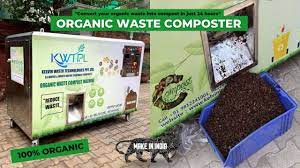What is Composting Machine?
A composting machine, also known as a composting system, is a mechanical device or system designed to facilitate and accelerate the composting process.
Composting is a natural biological process that turns organic materials into nutrient-rich humus, which can be used to enrich soil and improve its fertility. Composting machines are used to manage and optimize this process, making it more efficient, faster, and controlled.
Key features and functions of composting machines:
- Material Shredding or Chipping: Some composting machines are equipped with shredders or chippers that reduce the size of organic waste materials. Smaller pieces of waste decompose more rapidly, as they provide a larger surface area for microorganisms to work on.
- Aeration and Mixing: Proper aeration and mixing are essential for composting because they ensure that oxygen is available to the microorganisms responsible for decomposition. Composting machines often incorporate mechanisms for turning or agitating the compost pile to promote even decomposition and prevent the formation of anaerobic zones.
- Temperature Control: Composting generates heat as a natural byproduct of microbial activity. Composting machines may have temperature monitoring and control systems to ensure that the pile reaches and maintains the optimal temperature range for efficient decomposition. This helps kill weed seeds and pathogens while speeding up the process.
- Moisture Management: Adequate moisture is essential for composting. Composting machines may include moisture sensors and systems for adding water or maintaining the right moisture level in the compost pile.
- Insulation and Environmental Control: Some advanced composting machines are designed for indoor or enclosed environments, allowing for year-round composting in a controlled climate. These machines can be used in urban settings and areas with strict odor and pest control requirements.
- Scaling for Large Operations: Commercial composting machines are designed for large-scale operations, such as those used by municipalities or industrial composting facilities.
- Vermicomposting: Some composting machines are specifically designed for vermicomposting, a process that uses earthworms to aid in decomposition. These machines provide optimal conditions for the growth and activity of composting worms.
- Automated Controls: Modern composting machines may be equipped with automated controls and sensors that monitor and adjust parameters like temperature, moisture, and aeration to optimize the composting process.
How does composting Machine Work?
- Material Input: Organic waste materials are loaded into the composting machine. These materials can include food scraps, yard waste, agricultural residues, and other organic matter. Some composting machines may also include a shredding or chopping mechanism to reduce the size of the input materials, which accelerates decomposition.
- Aeration and Mixing: Proper Aeration is crucial for composting because it ensures that oxygen is available to the aerobic microorganisms responsible for decomposition. Composting machines often have mechanisms for turning or agitating the compost pile. This may involve rotating drums, conveyor belts, or mechanical arms that mix and aerate the materials. Good aeration prevents the formation of anaerobic conditions, which can lead to unpleasant odors and slow decomposition.
- Temperature Control: Composting generates heat because of microbial activity. Composting machines may include temperature monitoring and control systems to ensure that the compost pile reaches and maintains the optimal temperature range for efficient decomposition. The ideal temperature range is typically between 130°F to 160°F (54°C to 71°C). Elevated temperatures help kill weed seeds and pathogens while accelerating decomposition.
- Moisture Management: Adequate moisture is essential for composting. Composting machines may have moisture sensors and systems for adding water or maintaining the right moisture level in the compost pile. The moisture content should ideally be around 50-60%.
- Microbial Activity: As the compost pile is regularly mixed and aerated, microorganisms such as bacteria, fungi, and actinomycetes break down the organic matter. These microorganisms consume the organic materials, breaking them down into simpler compounds, including humus.
- Maturation: After a certain period of active decomposition, the compost matures, and the composting machine may slow down or stop its active composting functions. This allows the compost to undergo a curing or maturation phase, where it stabilizes and develops its final properties. The maturation phase can vary in duration but usually lasts several weeks to months.
- Output: Once the composting process is complete, the finished compost is discharged from the composting machine. It is typically screened to remove any remaining large particles and contaminants, resulting in high-quality compost that can be used to enrich soil and improve its fertility.
- Maintenance and Monitoring: Composting machines require regular maintenance to ensure their proper operation. This includes cleaning, lubrication, and occasional repairs. Monitoring systems may also track various parameters like temperature, moisture, and oxygen levels to optimize the composting process.
Why we need to use Organic Waste For Composting Machine?
Composting machines are an advanced and cost-effective way of handling waste. Most waste materials, especially edible ones, can be turned into something useful with composting machines.
As organic fertilizers are in the purest form and can be used for raising healthy crops, they save on waste handling and transportation, which are both necessary for land filling. They are also eco-friendly.
In addition to reducing methane production, they also benefit the soil. Organic fertilizers provide soil with nutrients that can be used in plantations. Compost prevents soil erosion and water retention when added to the soil. The organic waste machine is a comprehensive solution to a more sustainable future.
With technological advancements, more advanced and faster composting machines are making their way to the market, including those used in hospitality, education, and food.
Manufacturer of Organic Waste Composting Machine in Gurgaon
A leading manufacturer of organic waste composting machines, KWTPL provides world-class quality machines. We have easy-to-use organic waste converter machines for home and commercial use. Our machines are manufactured according to international quality standards. Contact us for the best compost machine prices in the market.
Benefits Organic Waste Composter Machine
- Reduced Environmental Impact
- Mitigation of Greenhouse Gas Emissions
- Nutrient-Rich Compost Production
- Soil Improvement
- Waste Reduction
- Economic Benefits
- Educational Opportunities
- Environmental Sustainability
- Improved Soil Structure and Water Retention
Conclusion
Organic Waste Composting machines play a vital role in sustainable waste management, environmental protection, and resource conservation. They offer multiple benefits for communities, agriculture, and the environment by converting organic waste into a valuable resource while minimizing negative impacts on ecosystems and public health.



